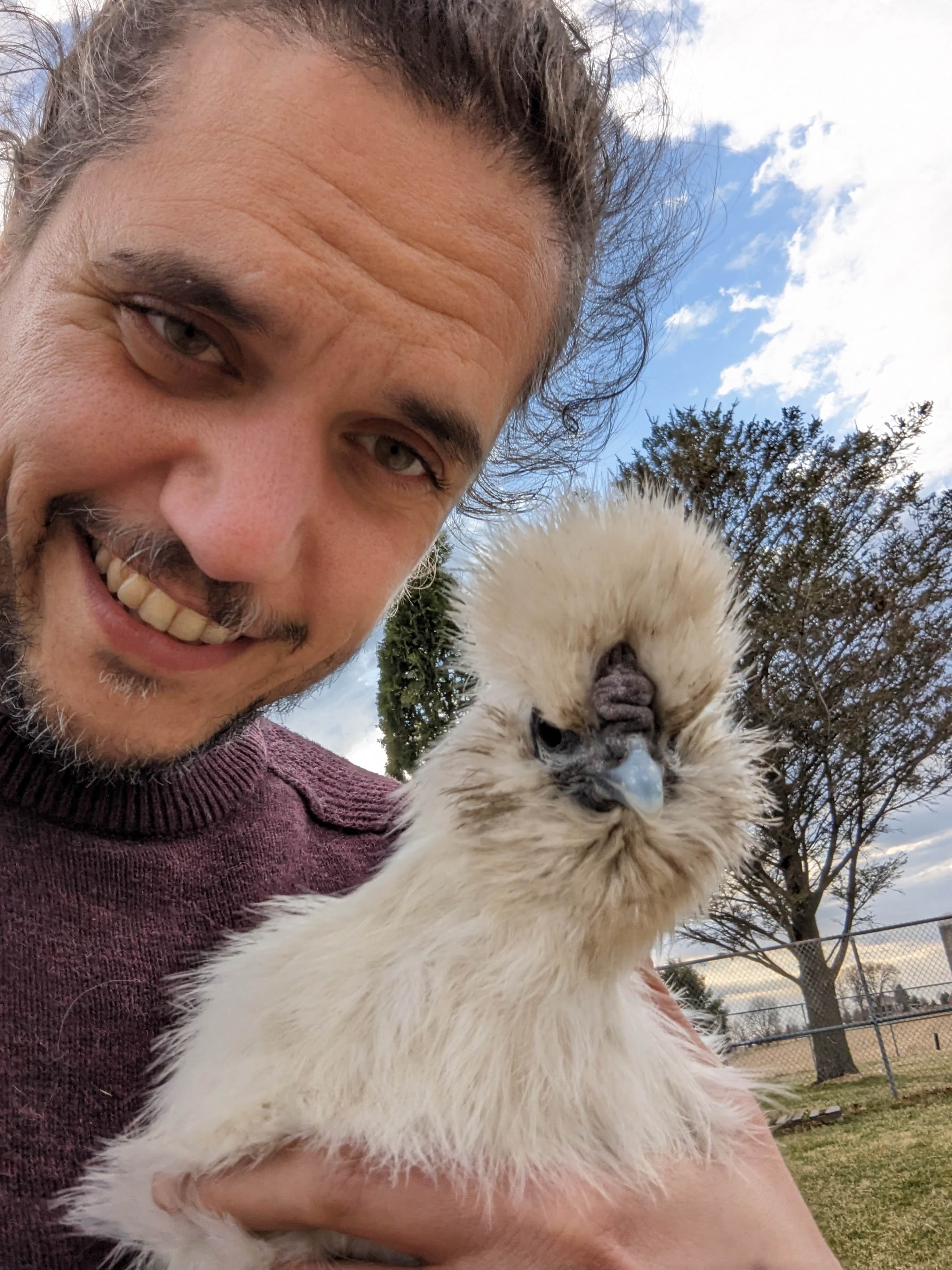They don’t have a brain really and kinda just float there. Do they even feel pain?
After having kept jellyfish as pets (Atlantic bay nettles), I wouldn’t really consider them to be vegetarian nor vegan. While similar to plants, seemed to have a greater sense of environmental awareness than my plants. Mine could sense light, have “off days”, and interact with their environment. It’s probably true that there’s not much going on there due to the small amount of nerves that control everything, but even when mine would accidentally get caught on tank cleaning tools or get bumped around they’d react in a protective way and to me it’s just similar enough to animalistic behavior that I’d not feel comfortable consuming them if I were vegan.
Plants feel a lot, they just can’t express their feelings in a way you can perceive. For example, they feel the difference between a human touching them and wind blowing.
Don’t most plants sense light and interact with their environment?
Tardigrades have been observed reacting defensively to danger, even offensively. I know they’re not plants, but do they feel pain? What about brine shrimp?
Jellyfish are super weird because they really blur the lines between plant/animal. It’s a really interesting question to ask honestly.
So is this theory of veganism to not cause pain to an animal? If so what about ethically sourced meat. Like bullet to the head/decapitation. Most of those creatures feel nothing, they just end.
Or is it to not eat anything that comes from the an organism from the Animalia kingdom because harming animals is immoral?
After proofreading, these sound more aggressive/argumentative than i had intended but they get the point across.
Veganism means to reduce the suffering and exploitation of animals as much as practically possible.
There is nothing ethical about killing a living being that doesn’t want to die.
I mean, sometimes its ethical. Its kind of unnecessary (and therefore immoral) at the scale of modern meat farms. But on a more individual level with like subsistence hunting/livestock, i dont feel like there are any ethical problems. Like if you need food or you will die, animals lives are worth less than humans lives…
The need to hunt for food to prevent dying yourself is not really a problem in today’s society unless you are indigenous and living outside of our society. So there is no real argument there.
I mean, yeah. Im also being pedantic with unqualified absolutes.
The fact remains sometimes it absolutely is ethical to kill stuff, even if they don’t want to die.
My general ethical foundation is based on my conscience saying “that would be bad” or “seems ok”. I fully admit that this is potentially a personal flaw, but I don’t feel bad about eating meat. I have a vague sense of guilt for the treatment of meaty animals, but honestly, it isn’t enough to offset the convenience of a burger.
Tldr sometimes its ethically okay to kill stuff, and I’m too lazy to do anything about benefitting from the majority of times when it isn’t ethical.
I respect the self-reflection in this comment. Sadly, I also feel a small need to ask you to think about ethics and morality slightly deeper. Imagine if your predecessors made similar comments about [insert moral failing of history]. How would you think about that?
I think most of us try to be good people, but it’s really hard to do the right thing if you never think about what is right and why (and yes, sometimes that includes not being lazy).
There is an assumption here that i don’t think of right and wrong. Which isn’t true, as evidenced by this entire comment chain. My morality is based off of my conscience, and it has a final say in how i act. But I still think and explore ethically difficult situations to determine what is right, wrong, or grayish.
I just didnt describe my entire ethical schema, because, as i said i am lazy. Lazy and self-aware enough to know that there is not much i can or will do to improve the morality of meat consumption. And honestly, that specific problem is pretty low on my list of ethical dilemmas. But it’s fun to talk about.
yeah but what if it tastes good
15 minutes of pleasure from eating doesn’t justify forcing an animal into existence to a life of suffering and premature death, especially when there are so many great alternatives - without even considering the the secondary effects of animal agriculture, including climate damage, antibiotic resistant bacteria, and the likelihood of bringing forward the next pandemic.
I admit animals taste good but that’s still not a good enough reason to kill them. It’s simply unnecessary.
I thought it had less to do with suffering and exploitation (animals do this to each other, no way to stop that nor should we) but more to do with climate change. Cattle farms are causing massive climate change for instance.
Humans are moral agents, though. Just because something happens in nature, that doesn’t make it okay. There are lots of examples of rape among wild animals, but that doesn’t make it okay for humans to do it.
A lot of vegans are concerned about climate change, too, but it’s really tangential to the philosophy. Veganism came out of the animal rights movement, so it’s really concerned with exploitation and suffering. If there were no environmental issues with animal products, vegans would still be vegans.
Morals are a social construct
Just because something is a social construct doesn’t mean it isn’t real or important.
It can be either or both. Whether other animals or people cause suffering to animals isn’t a statement about whether it is ethical for people to do so (naturalistic fallacy).
In terms of strict definitions of what should or should not be eaten based on its suffering, I think that’s much harder to do. There’s always going to be some gray area. Plants respond to stimuli and try to protect themselves. Jellyfish and insects and cultures cells are on a spectrum where it may not be clear how to draw the line.
Removed by mod
cannibalism too exists in “nature”. I don’t see any of you meat justifiers treading that line of thought to its coherent end.
a lion or an eagle eats anything. Most (if not all) carcass eating humans make arbitrary choices: Dogs or cats shan’t be eaten. Pigs or this or that is a sin. Eating humans are monstrous.
they cause very little suffering. the systemic factory farming of animals and the deforestation in the process of meat production causes unimaginable collective suffering.
you don’t care about veganism because you are willfully ignorant.
So is this theory of veganism to not cause pain to an animal? If so what about ethically sourced meat. Like bullet to the head/decapitation. Most of those creatures feel nothing, they just end.
lots (propably most) animals used for farming meat are in pain during their lives.
That’s longer than the time they’re dying in any case.I understand that completely, death isn’t where the suffering usually occurs. This brings me to another question that i proposed in response to a different comment.
I had family that raised a cow to eventually become meat. It was named Tasty and lived up to its namesake. Tasty was treated well and killed quickly and cleanly. Is that, like, bad?
I’d say that’s a philosophical question.
And worse even, I’d say this is something that changes with the culture of people.
a while ago, gladiators killing & maiming each other for entertainment was considered fine.
Raping and Abducting during wartime was normal.Currently, I’d say the cultural moral compass has shifted enough, to consider these two examples rather bad behaviour.
But as Tasty seems to have had a nice life and didn’t suffer, so had it better than most cows which end up in a similar fate, I’d say that currently this would not be considered “bad” behaviour by most people.
Of course there is a viewpoint already out, that all killing of animals is equivalent, in other words equivalent to killing humans. From that point of view, what you did is rather horrific.
Maybe, in some time, when something like lab-grown meat without any nervous system is commonplace, killing animals for food becomes as horrific as we consider killing other humans for food.
Or, you know, it could also swing the other way, and an apocalypse makes Soylent from dead people completely normal food.I’m an oft-invisible lurker, however, your comment is amazing and I appreciate it. Cheers!
It’s the second one. In the first case, you unnecessarily kill an animal. A fair question would be if it was a natural death of the animal, like you stumbled upon a fresh carcass, is eating that still ethically or morally gray?
But that’s not the point, veganism makes sense in first world countries with factory farming. It’s very clear that mass produced animal products are no go’s.
They’re animals, so no.
No.
No Brain? For Jellyfish, No Problem
“I think sometimes people use its lack of a brain to treat a jellyfish in ways we wouldn’t treat another animal,” Helm says. “There are robots in South Korea that drag around the bay and suck in jellyfish and shred them alive. I’m a biologist and sometimes sacrifice animals, but I try to be humane about it. We don’t know what they are feeling, but they certainly have aversion to things that cause them harm; try to snip a tentacle and they will swim away very vigorously. Sure, they don’t have brains, but I don’t think that is an excuse to put them through a blender.”
If you care about brainless animals, you might as well care about plants.
Are we not supposed to care about plants?
Jellyfish do have neurons. Fewer than an insect. Much fewer than ChatGPT. But still something. A better example is sea sponges, which don’t have any neurons at all.
Removed by mod
But everyone and everything rather avoid pain, wouldn’t they? And if I would like to treat those the way I would like to be treated, then why not try to help mitigate that pain where possible?
The follow up question would be what us and isn’t pain.
If a bacterium swimming in one direction encounters a toxin and changes direction to avoid dying, did it experience pain? If a tobacco plant reacts to attacks from insects by producing more nicotine and alerting its neighbours to do the same through signals sent through both rhizomes and airborne pheromones, does it experience pain? What about a worker ant, whose behaviour can be perfectly simulated by an algorithm simple enough that you can simulate hundreds of ants interacting?
Personally, I’d say none of these organisms are capable of feeling pain. Or if they are with the help of some definitions of what constitutes pain, it’s just a signal like an automated assembly machine getting a signal from its sensors that a human entered its work space and it needs to slow down its robot arm to snails pace. So still incapable of suffering.
Also, if you set the threshold for what constitutes the ability for suffering too low, you quickly collide with the ethics of even early term abortion.
No, just no
Ok, but the question was whether or not they feel pain. We can definitively say they display escape behaviors when presented with an aversive stimulus, so I’d say it’s likely they do feel some sort of pain, even if their perception of it is nothing like that displayed by animals with central nervous systems.
The morality of shredding them alive by the thousands is a different conversation, but I would say yes, nature is cruel, and yes, it’s possible for humans to mimic nature and kill animals in similar ways, but humans also have a knack for taking things too far, eg chickens bred to be so big they can’t even walk or jellyfish-murdering robots
This is one of those things that’s hard to define. If a popcorn kernel gets too hot, it pops and it’s almost like it’s trying to run from the heat. How is that different from a jellyfish reaction to pain? There’s a lot of good arguments on both sides.
Sometimes, I wonder how far away we really are from the popcorn kernel.
We can definitely say they display escape behaviours when presented with an adverse stimulus, so I’d say it’s likely they do feel some sort of pain
It’s ironic that your username is “protist”, since even many single cell organisms display escape behaviours when presented with an adverse stimulus.
They have no brain but aren’t they like almost entirely nervous system? That’s all you need to feel pain; the brain just makes it more complicated than “ouch, move away from that.”
If having a reaction to physical damage (like moving away) is enough to be qualified as pain, then some plants feel pain too. We studied in biology a plant that when cut/eaten by animals releases chemicals that warn plants around it and triggers them to release another chemical that interferes with animal’s digestive system and make them starve (I don’t remember the name of the plant unfortunately). So should we consider this as pain too ?
there are many other examples here too:wikipedia
man I hate philosophy
Yes. It’s literally how pain is defined in an anatomical sense.
If reaction to physicals damage is enough to qualify as pain, a brick wall feels pain. If you damage it, it will start having holes, and eventually fall over completely.
I think at the very least you’d need some kind of learning. Pain is the stuff you learn to avoid and pleasure is the stuff you learn to do more. Without that, it’s impossible to say whether an instinctive response to stimuli is a negative or positive feeling.
Tobacco and tomato plants do something similar. They produce more nicotine to poison the insects eating them and also warn their neighbours.
(Yes, tomatoes also produce nicotine, and it is technically possible to become slightly addicted to tomatoes if you have a very tomato-heavy diet)
nicotine in the tomato too (which the plant produces for the animals to eat and spread its grains) or rather in the leaves, flowers and stem?
As far as I know it’s in the fruit as well to some snall degree, but I’m no expert
moral of the story: if you have an addiction, replace it with tomatoes
I’m not sure it can be answered; it depends on the person.
Some people go with the lack of a central nervous system.
So Oysters are okay by that standard
So ¯\_(ツ)_/¯
would u even get anything out of eating it tho?
Removed by mod
In China, it can be served as a salad, and I believe it is quite good.
Once, at the gwailo table of a wedding, I saw a picky eater mistake jelly fish for noodles, try them and like them.
Their face when they found out was…
More duck tongues for the rest of us.
China is so weird
Given a choice, if they run away from a stimulus all the time, it is very much “painful”.
Nope. Animal product. Would be ok for pescatarians, however.
The problem is if you do this, you have to come up with a word for people who don’t eat fish, but do eat insects and crustaceans, and people who don’t eat them, but do eat jellyfish, and people who don’t eat them, but eat (or more realistically, use the corpses of) sea sponges. And then there’s people who never eat it, people who eat it but only if otherwise it would get thrown away, people who eat it but only if they’re sure the animal was raised ethically, people who will never eat meat but only eat animal products if it was raised ethically, etc. It’s really not worth having overly specific words like that, and nobody is going to remember them.
Man, you’re gonna be really pissed when you open up the dictionary…
“Man, you’re gonna be really pissed when you open up the dictionary…” 👆🤣
Yeah, bro decided to rant against half the English language and pretty much all scientific terminology. I’m just sitting back here with the popcorn watching him dig his own grave.
sorry, jerboa is a new app. i posted a laughing smiley under a previous comment and deleted the message while editing it to include the original one.
i left it as it is thinking that it doesn’t matter. If i knew you needed it for your popcorn, i would have tried harder.
this one made me laugh: Man, you’re gonna be really pissed when you open up the dictionary…
Definitions are approximate. Defining “man” as “featherless biped” is good enough for most situations, but a plucked chicken isn’t a man and someone who lost a leg still is.
just stop! Go read that lesson again. You misunderstood the moral of that story
Sorry. I thought the problem was that definitions are ultimately approximations to help you understand the meaning of the word. Checking it again, the moral was actually that Plato forgot to add “with broad nails”, and once he had that he had the perfect definition of a human that everyone can always use.
🤦
Holy shit this thread is full of dipshits that don’t know anything about veganism. A bunch of even dumber fucks think plants are sentient or feel pain. You animal abuse apologist should actually take some time to understand why people are vegan.
Anyway OP, for this particular question you’re going to find two vegan camps.
-
Camp 1 - the majority of vegans - No brain. No conscious experience. Not sentient. There is no subject, so there is no one to grant rights to. You can eat jellyfish - but like every other vegan on the planet I’d ask why the fuck you want to eat then instead of literally anything else that’s vegan. Then we remember that, it’s just a gotcha question. Maybe focus on questions that seeks to reduce and reject the trillion+ other victims people not being vegan creates.
-
Camp 2 - the minority of vegans - Isn’t plant matter not vegan >:(
Jellyfish are consumed as food in some parts of the world. I think the question may come from the fact that there’s always some articles around about how jellyfish may be the food of the future, since they can be grown at sea (reducing land use) and don’t require feed beyond algae, which is great from both an environmental and resource management perspective. I’m not sure it’s entirely a cynical gotcha question :)
So some Asian cultures do eat jellyfish. Maybe this is a gotcha question or maybe it’s just someone coming from a less eurocentric background.
There’s actually a lot of interesting science around plant “mentation” for lack of a better term, stuff that’s actually super scary if you stop to think about it.
https://www.ncbi.nlm.nih.gov/pmc/articles/PMC3405699/
“Plants emit volatile organic compounds (VOCs) as a means to warn other plants of impending danger. Nearby plants exposed to the induced VOCs prepare their own defense weapons in response.”
https://www.discovermagazine.com/planet-earth/is-plant-communication-a-real-thing
"Lilach Hadany, a professor at Tel Aviv University’s School of Plant Sciences and Food Security, wanted to better understand whether plants use the acoustic realm of communication, too.
In a study published this year, her team put tomato and tobacco plants in an acoustically isolated box and then recorded any ultrasonic sounds produced between 20 and 150 kilohertz. They experimented with cutting stems or leaving them without water as if to simulate drought.
The researchers found that the plants emitted popping and clicking sounds at around 60 decibels, approximately as loud as human chatter. These sounds were at an ultrasonic frequency that humans cannot naturally hear, however."
https://www.newyorker.com/magazine/2013/12/23/the-intelligent-plant
“Plants are able to sense and optimally respond to so many environmental variables—light, water, gravity, temperature, soil structure, nutrients, toxins, microbes, herbivores, chemical signals from other plants—that there may exist some brainlike information-processing system to integrate the data and coördinate a plant’s behavioral response. The authors pointed out that electrical and chemical signalling systems have been identified in plants which are homologous to those found in the nervous systems of animals. They also noted that neurotransmitters such as serotonin, dopamine, and glutamate have been found in plants, though their role remains unclear.”
What you are describing is reaction to stimuli. You also describe gas releasing from tomatoes. Plants definitely have some form of biological intelligence but Vegans don’t care about that and that’s my point. Your comment doesn’t address OP’s question because what you are talking about has nothing to do with Veganism. This is why I got so dang frustrated. So many of these commenters were not in a position to answer OP’s question because they don’t know what Veganism is or what Vegans value.
Biological intelligence is not the same as having a subjective experience. If there is no subject, there is no one to grant rights to. There is no one ever experiencing pain or pleasure etc. You could at best take an agnostic position on plant consciousness. As we understand it today, consciousness is an emerging property of life with brains/nervous systems. In any case you are probably and hopefully wholly uncaring of tomatoes being harvested, and in that respect it’s hard for me to discern your point of discussion as good faith.
Oh, I don’t care about tomatoes being harvested any more than livestock being slaughtered, I’m not a vegan.
I find the science behind plant communication fascinating and there’s more going on there than we currently comprehend.
Yeah it’s totally fine to be fascinated with the chemical interactions of plants. This just wasn’t the thread to bring it up if we’re addressing OP’s question in good faith.
I was responding to your (rather snide, now deleted) comment regarding “idiots in the thread posting about plant intelligence.”
There is more going on with plant communication than we give them credit for. Can it be called “intelligence”? Well, not as we currently comprehend it, no. But at the same time, it’s not as easily dismissed either.
Yeah, I think derailing the thread with bad faith intentions to redefine Veganism and not answering OP’s question is pretty idiotic. Mod thought my comment was mean, but idc.
Ecological Vegans: A pound of animals tends to take 10 lbs of plants to sustain. Also other animals need these resources so using the smallest lowest impact sources to supply ourselves with food makes it more “ecologically vegan”
That said I don’t think jellyfish have any kind of intelligence we can sympathize with so anti cruelty vegans as far as we know can eat jellyfish unless some scientific breakthrough is made.
There’s a great old radiolab that covers and critiques ‘plant intelligence’ but afaik plants are no more intelligent than your immune system - they have some kind of stimulus memory but nothing resembling human logic or sensation
-
By a strict definition, no. But most vegans don’t really care about scientific classification. Personally I don’t think they’re sentient and think it’s fine.
Removed by mod
did you eat them?
Apparently removing other people’s comments you don’t like is a thing here. They can eat shit
i thought your comment was silly, but there was nothing that needed a removal. I’m sorry to read that
is one of your mentioned friends a mod here? 😅
Must be. My comment was made lightheartedly but it seems that power tripping crybabies are in charge here already. Sad. I had real hopes for lemmy.
Are you outing yourself as vegan?
I own a crowbar, we can test for pain.
So tough online. Joke’s on you. I like that shit.
Jellyfish are not sentient either. OP may be on to something here
I thought this post was about whether jellyfish had a vegan diet. I had no idea being vegan meant it’s ok to eat non-sentient animals as well.
A lot of Jelly fish are immortal? Just leave a few cells and wait for it to come back to life. Death-free food for the win
I mean, milk could also easily be death-free, but it’s not vegan. It’s also not suffering-free. So this suggestion kind of misses the point.
Removed by mod
I mean, what cow wouldn’t want to have sperm shoved up it’s apparently not privates to be continuously impregnated. Sounds like a party
It doesn’t have to be that way
But it mostly is. And calves likely get shot afterwards (or worse) both for population control and, well, you can’t have them drinking all the milk now, can you? Same as eggs could be cruelty free, if we ignore the literal shredding of male chicks thats happening on a massive scale.
If you want to mass produce these things, which are both produced by females exclusively as part of their reproduction cycle, you basically have no other choice but to get rid of most males or even most children in the case of milk.
And even if you somehow solve this, I still would argue that its morally wrong to even have these breeds of e.g. chickens who lay this many eggs. Their bodies were never ment to do this and they suffer from sever health problems because of this.
Milk that we can buy in supermarkets is produced by special super breed cows that produce around 30000 liters (ca.8000 gallons) of milk per year. After 6 years these animals die out of complete exhaustion or as soon as they don’t produce enough milk anymore. Their udder are so big they can barely move, due to the frequent milking they are also usually infected (yummy goo, goes straight into the milk- luckily it’s boiled)
If you ever talked to woman that is breast feeding, you probably found out how exhausting it is to produce a highly nutritious food for a new born.
Yes milking cows for mass producing milk is animal abuse and it is really hard to find milk that is not produced in this way. I am telling you this as a person who isn’t vegan or vegetarian. I think that veganism is the way to go, eating animal products is shit, there is no way to produce them in a “good” way for 7billion people. I am just too weak.
Removed by mod
This reddit ass comment
Removed by mod
Removed by mod
Man why the fuck we out here catching strays on a post about JELLYFISH wtf
what it say?
Sorry bro xD
Jellyfish belong to Cnidaria, which is a phylum under kingdom Animalia
TLDR: Jellyfish are biologicly animals
There are some animal that you can eat that are vegan.
The fig wasp for example is a tiny wasp that climbs into fig flowers to lay their eggs in them, polinating them in the process. Once the flower turns into a fruit, the eggs hatch and climb out of it. The dead mother wasp stays behind.
Since the wasp dying in the fig is required both for the plant and the wasp to reproduce they are considered vegan to eat.
So the next time you eat a fig, take a closer look. Maybe you’ll see the dead wasp (or maybe you’ve already swallowed it)
Do vegans generally accept that figs are okay to eat?
I grew up with a crazy vegan mother who dragged me to the outings of her crazy vegan club and they were all vehemently against eating figs. We don’t even live in a place where figs are common import, but they were so mad about it.





















